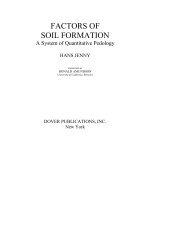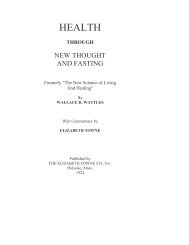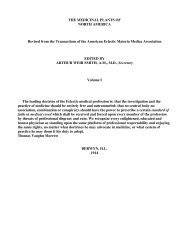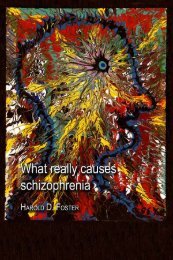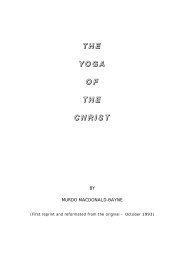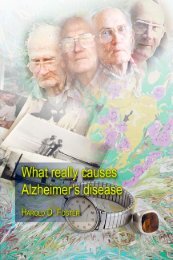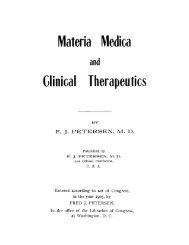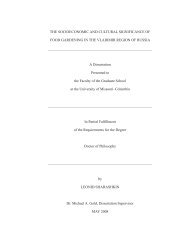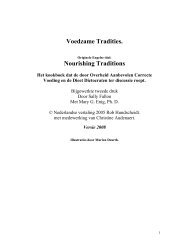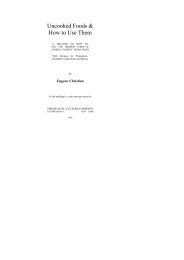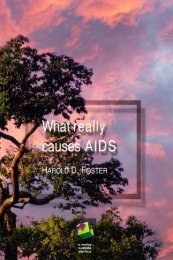historical and scientific perspectives on the health of canada's first ...
historical and scientific perspectives on the health of canada's first ...
historical and scientific perspectives on the health of canada's first ...
You also want an ePaper? Increase the reach of your titles
YUMPU automatically turns print PDFs into web optimized ePapers that Google loves.
<strong>the</strong> Bar<strong>on</strong> de Lah<strong>on</strong>tan reported that: “The savages are a robust <str<strong>on</strong>g>and</str<strong>on</strong>g> vigorous sort <strong>of</strong> people, <strong>of</strong> a<br />
sanguine temperament, <str<strong>on</strong>g>and</str<strong>on</strong>g> an admirable complexi<strong>on</strong> ...unacquainted with a great many<br />
diseases that afflict <strong>the</strong> Europeans, such as <strong>the</strong> gout, gravel, <str<strong>on</strong>g>and</str<strong>on</strong>g> dropsy, etc. Their <strong>health</strong> is firm,<br />
notwithst<str<strong>on</strong>g>and</str<strong>on</strong>g>ing that <strong>the</strong>y use no precauti<strong>on</strong> to preserve it.” 6<br />
Historian George B. Grinnell c<strong>on</strong>cluded that <strong>the</strong> “struggle for existence weeded out <strong>the</strong> weak <str<strong>on</strong>g>and</str<strong>on</strong>g><br />
<strong>the</strong> sickly… <str<strong>on</strong>g>and</str<strong>on</strong>g> created a race physically perfect <str<strong>on</strong>g>and</str<strong>on</strong>g> mentally fitted to cope with <strong>the</strong> c<strong>on</strong>diti<strong>on</strong>s<br />
which <strong>the</strong>y were forced to meet, so l<strong>on</strong>g as <strong>the</strong>y were left to <strong>the</strong>mselves.” 7 In his examinati<strong>on</strong> <strong>of</strong><br />
pre-Columbian life in southwestern North America Hewett affirms that: “In bodily proporti<strong>on</strong>s,<br />
colour, gesture, dignity <strong>of</strong> bearing, <strong>the</strong> race is incomparable. It was free from our infectious<br />
scourges, tuberculosis, <str<strong>on</strong>g>and</str<strong>on</strong>g> syphilis, <str<strong>on</strong>g>and</str<strong>on</strong>g> <strong>the</strong> resulting physical deformities <str<strong>on</strong>g>and</str<strong>on</strong>g> mental<br />
degeneracies. It was probably free from leprosy, scr<strong>of</strong>ula, <str<strong>on</strong>g>and</str<strong>on</strong>g> cancer, <str<strong>on</strong>g>and</str<strong>on</strong>g> it is safe to say that<br />
nervous prostrati<strong>on</strong> was unknown to <strong>the</strong> Indian.” 8<br />
William Wood in describing early c<strong>on</strong>tact with <strong>the</strong> original inhabitants <strong>of</strong> <strong>the</strong> nor<strong>the</strong>astern<br />
woodl<str<strong>on</strong>g>and</str<strong>on</strong>g>s <strong>of</strong> North America spoke <strong>of</strong> <strong>the</strong>m possessing "lusty <str<strong>on</strong>g>and</str<strong>on</strong>g> <strong>health</strong>ful" bodies which did<br />
not experience “those <strong>health</strong> wasting diseases which are incident to o<strong>the</strong>r countries [such] as<br />
fevers, pleurisies, calentures, agues, obstructi<strong>on</strong>s, c<strong>on</strong>sumpti<strong>on</strong>s…c<strong>on</strong>vulsi<strong>on</strong>s, apoplexies,<br />
gouts, st<strong>on</strong>es, tooth-aches, measles or <strong>the</strong> like.” He reported that most <strong>of</strong> <strong>the</strong>m reached fifty<br />
before a “wrinkled brow or grey hair” betrayed <strong>the</strong>ir age <str<strong>on</strong>g>and</str<strong>on</strong>g> that <strong>the</strong>y spun out <strong>the</strong> thread <strong>of</strong><br />
<strong>the</strong>ir days to fair length, numbering threescore, fourscore, some a hundred years. 9<br />
John Ross’s 1830 encounter with <strong>the</strong> Inuit in <strong>the</strong> far<br />
north was typical <strong>of</strong> <strong>the</strong> many early c<strong>on</strong>tact reports <strong>on</strong><br />
North American Indians. He speaks <strong>of</strong> this people as<br />
“occupying so apparently hopeless a country, so<br />
barren, so wild, <str<strong>on</strong>g>and</str<strong>on</strong>g> so repulsive; <str<strong>on</strong>g>and</str<strong>on</strong>g> yet enjoying<br />
<strong>the</strong> most perfect vigour [<str<strong>on</strong>g>and</str<strong>on</strong>g>] <strong>the</strong> most well-fed<br />
<strong>health</strong>.” 10<br />
Paleopathologist Ales Hrdlicka comments that:<br />
Inuit Man - Canadian Arctic<br />
The skeletal remains <strong>of</strong> unquesti<strong>on</strong>ably pre-Columbian date are, barring few<br />
excepti<strong>on</strong>s, remarkably free from disease. Whole important scourges were wholly<br />
unknown. There was no pathologic microcephaly, no hydrocephaly. There was no<br />
plague, cholera, typhus, smallpox or measles. Cancer was rare, <str<strong>on</strong>g>and</str<strong>on</strong>g> even<br />
fractures were infrequent. There was no lepra [leprosy]… <strong>the</strong>re is as yet no a<br />
single instance <strong>of</strong>… pre-Columbian syphilis. There were, apparently no nevi [skin<br />
tumors]… no troubles with <strong>the</strong> feet, such as fallen arches. And judging by later<br />
acquired knowledge, <strong>the</strong>re was a much greater scarcity than in <strong>the</strong> white<br />
populati<strong>on</strong> <strong>of</strong> many diseases <strong>of</strong> <strong>the</strong> skin, <strong>of</strong> most mental disorders, <str<strong>on</strong>g>and</str<strong>on</strong>g> <strong>of</strong> o<strong>the</strong>r<br />
serious c<strong>on</strong>diti<strong>on</strong>s. 11<br />
Writing in <strong>the</strong> late 1800s Daniel Brint<strong>on</strong> refers to <strong>the</strong> advanced physical c<strong>on</strong>diti<strong>on</strong> <strong>of</strong> <strong>the</strong> Iroquois<br />
people in which he says “They were unsurpassed by any <strong>on</strong> <strong>the</strong> c<strong>on</strong>tinent, <str<strong>on</strong>g>and</str<strong>on</strong>g> I may say be any<br />
in <strong>the</strong> world.” 12 This is corroborated by Grinnell who notes that out <strong>of</strong> <strong>the</strong> several hundred<br />
4




